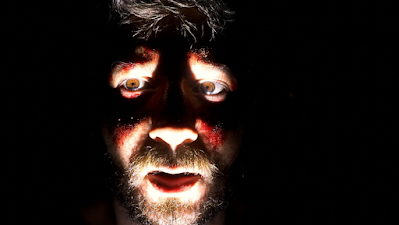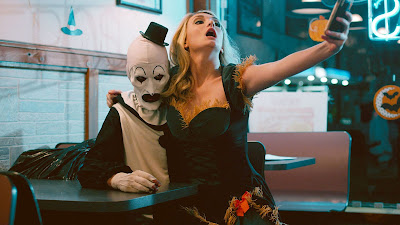Friday, September 1, 2023
Suspiria / **** (1977)
Wednesday, August 30, 2023
An American Werewolf in London / ***1/2 (1981)
Thursday, August 24, 2023
Lessons from Criterion:
"Night of the Living Dead" by George A. Romero
Saturday, August 19, 2023
Talk to Me / *** (2023)
Monday, August 14, 2023
Halloween / ***1/2 (1978)
Saturday, August 5, 2023
X / ***1/2 (2022)
Friday, August 4, 2023
THE TALKATIVE KID, THE THOUGHTFUL ADULT – 25 Years as an Online Film Writer
Saturday, July 29, 2023
When a Stranger Calls / *** (1979)
Friday, July 21, 2023
Death Proof / *** (2007)
Saturday, July 15, 2023
The Outwaters / * (2022)
Sunday, February 12, 2023
Into the Storm / ** (2014)
Tuesday, January 31, 2023
Mandy / * (2018)
 In theory, a movie like “Mandy” would be right up the same alley of brazen gorefests that have been known to captivate my morbid sense of voyeurism. Ripped from the familiar cloth as any number of audacious horror stories set in the lurid world of pulp fiction, the picture makes a bold promise from its very first frame: all that is about to happen will be unlike anything we have witnessed on screen – or, at the bare minimum, fresh enough to draw comparisons to Dario Argento and Mario Bava, the architects of the decadent excess we associate with Giallo. Indeed, countless critics and colleagues have hailed the picture as a triumph of its medium, a surrealistic experience where the framework of the familiar revenge formula is twisted into a fever dream of contemplative symbolism and thematic excess. And who wouldn’t want that, especially nowadays as the genre appears caught somewhere between the extremes of vague nuance and gratuitous overkill?
In theory, a movie like “Mandy” would be right up the same alley of brazen gorefests that have been known to captivate my morbid sense of voyeurism. Ripped from the familiar cloth as any number of audacious horror stories set in the lurid world of pulp fiction, the picture makes a bold promise from its very first frame: all that is about to happen will be unlike anything we have witnessed on screen – or, at the bare minimum, fresh enough to draw comparisons to Dario Argento and Mario Bava, the architects of the decadent excess we associate with Giallo. Indeed, countless critics and colleagues have hailed the picture as a triumph of its medium, a surrealistic experience where the framework of the familiar revenge formula is twisted into a fever dream of contemplative symbolism and thematic excess. And who wouldn’t want that, especially nowadays as the genre appears caught somewhere between the extremes of vague nuance and gratuitous overkill?
Sunday, January 22, 2023
Terrifier / * (2017)
Tuesday, August 2, 2022
Jurassic World: Dominion / ** (2022)
Sunday, September 26, 2021
Taxi Driver / **** (1976)




.jpg)









